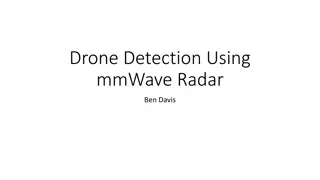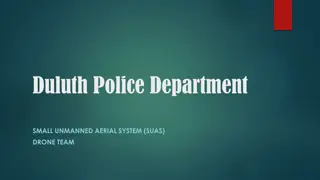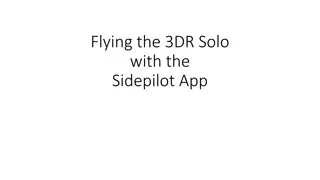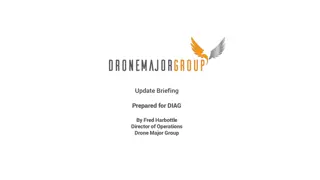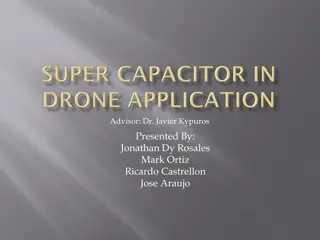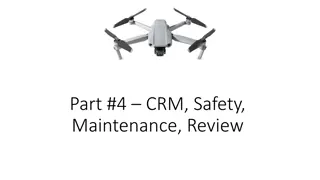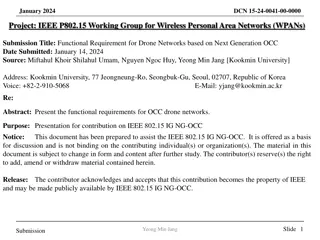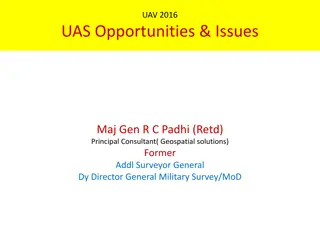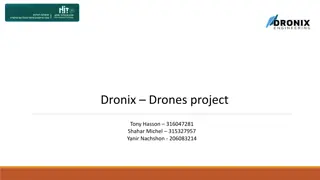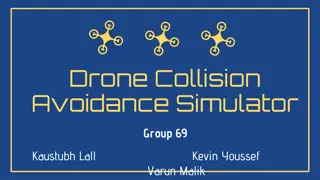Exploring Challenges and Opportunities in Adopting a Drone Program
Exploring the complexities involved in establishing a drone program, this content discusses public perceptions, realities, policy considerations, partnerships, board approvals, liability concerns, justifications, and the process of obtaining a Certificate of Authorization. It delves into issues such as public concerns regarding privacy and safety, liability for damages, risk assessment versus rewards, and the importance of proper authorization for unmanned aircraft activities. The content highlights the diverse considerations involved in implementing a drone program, ranging from public perceptions to legal implications, and the need for thorough planning and adherence to regulations.
- Drone Program Challenges
- Public Perception
- Policy Adoption
- Risk Assessment
- Certificate of Authorization
Download Presentation

Please find below an Image/Link to download the presentation.
The content on the website is provided AS IS for your information and personal use only. It may not be sold, licensed, or shared on other websites without obtaining consent from the author. Download presentation by click this link. If you encounter any issues during the download, it is possible that the publisher has removed the file from their server.
E N D
Presentation Transcript
Social Media 2009 vs. UAS Programs 2019 Public Perception Local Govt. Perception Elected Official's Perception
Policy and Procedure Adoption and Implementation Local Emergency Services Law Enforcement Compliance Issues Who s Responsible?
Partnerships Spontaneous/Rogue Volunteers Fire Departments Law Enforcement Partnering Agencies UAS Traffic Management
Board Approval Public Concerns 4thAmendment Right Prohibits unreasonable searches and seizures Sets requirements for warrants External attachments for UAS devices High Resolution cameras IR Cameras Advanced listening devices Weaponizing UAS devices
Board Approval Public Concerns Liability Livestock disruption Personal property damages from UAS accident Who s going to pay?
Board Approval Justification Risk vs. Reward Incident response and investigations Lost person incidents Damage Assessment Personnel safety over watch Improved after action reviews and critiques of training evolutions/real world events
COA Certificate of Authorization or waiver is an authorization issued by the Air Traffic Organization to a public operator for a specific Unmanned Aircraft activity. Why Harnett chose COA initially Commissioners wanted governmental approval instead of commercial Identified non emergent GIS vs emergent usage Public Safety Establishment of UAS program Self certification of pilots (2015) 333 exemption- Private pilot license staff member (2019) Daytime waiver included
COA Process Overview Determine the need Acquire UAS Letter of Authorization Access to CAPS COA Application Process Establish policies Submit application Provide FAA requested updates Await review results
Letter of Authorization Letter from your City, County, or State Attorney s office declaring that your police or fire department is in fact a public entity. This public letter of declaration should be submitted by the attorney s office and mailed directly to the FAA, naming you as a technical point of contact Access given to COA portal
FAA CAPS Application Organization demographics Program Manager Where you will fly UAV Specifications Procedures/Policies Pilots/Training
Aircraft Specifications Serial Number Weight Flight Speed Endurance Range GPS Navigational Lighting IR Payload Obstacle Detection Flight Data Recording
Airworthiness Statement What/Who determines aircraft to be airworthy
Policies Emergency Procedure Fire Loss of Link Line of sight Lost Loss of engine Inclement weather Medical Emergency crew/non-crew Airborne collision Available resources to aid
Policies Lost Communications Onscene comms Primary/Backup Lost comms between UAS staff PIC & ATC Notifications
Policies Lost Link Preflight actions Airborne actions
Training Establish policy Training requirements
Special Government interest First responders and others organizations responding to natural disasters or other emergency situations may be eligible for expedited approval through our Special Governmental Interest (SGI) process. Operations that may be considered include: Firefighting Search and Rescue Law Enforcement Utility or Other Critical Infrastructure Restoration Incident Awareness and Analysis Damage Assessments Supporting Disaster Recovery Related Insurance Claims Media Coverage Providing Crucial Information to the Public
FAA Contact COA 9-AJR-36-UAS@faa.gov SGI 9-ator-hq-sosc@faa.gov






